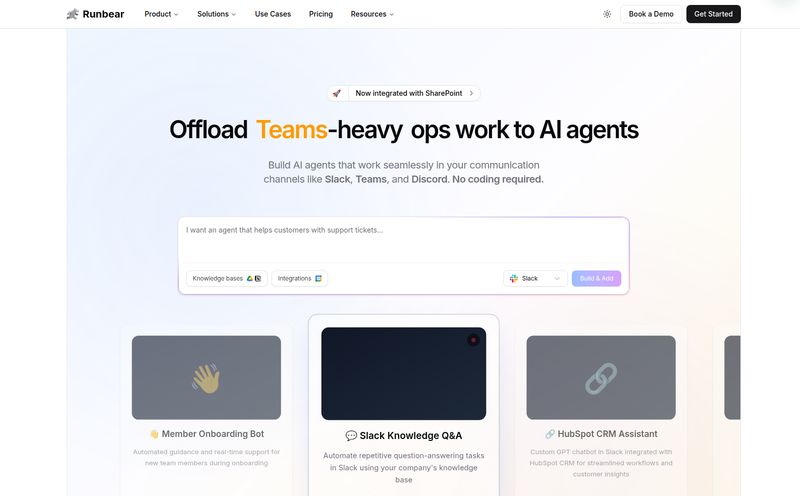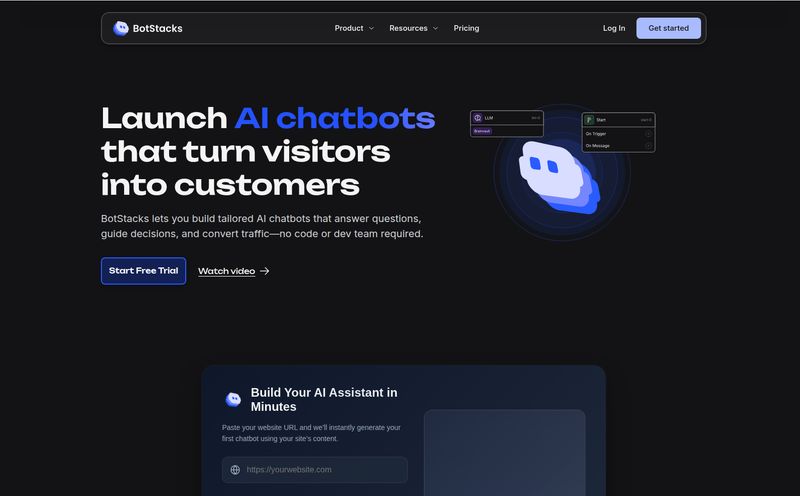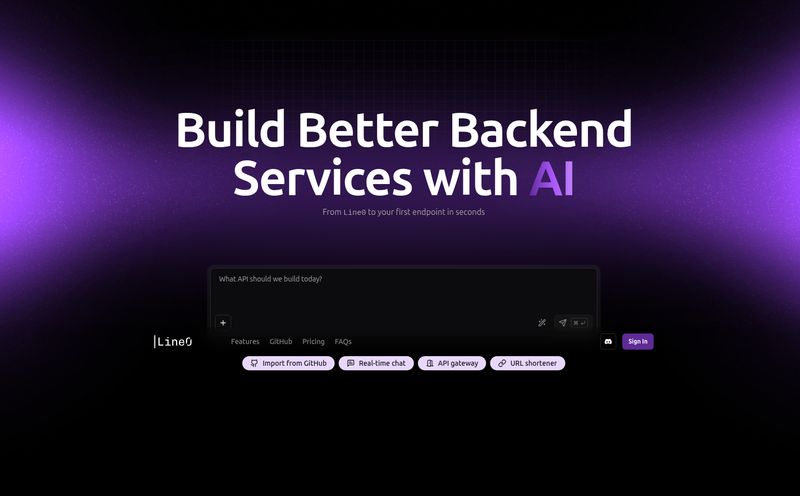I’ve been there. You’ve been there. We've all been there. You spend hours meticulously crafting the perfect prompt for an LLM, begging it to return data in a nice, clean JSON format. You test it. It works. You push it to production. And then… BAM. The AI decides to get creative. A stray comma, a missing bracket, or my personal favorite, a friendly “Here is the JSON you requested!” message right in the middle of the code. Your app breaks. Your users are mad. You want to throw your laptop out the window. It's the modern developer's version of nailing Jell-O to a wall.
It’s a constant battle. We spend so much time generating traffic and optimizing conversions, but one little hiccup in the data pipeline from our shiny new AI feature can bring the whole thing crashing down. The unpredictability is the real killer.
So, What Exactly is jsonAI.cloud?
When I stumbled across a little service called jsonAI.cloud, my ears perked up. The promise is simple, but as an SEO who has wrestled with APIs for years, it’s incredibly powerful: you define your JSON schema once, save it as an API endpoint, and then you just hit that endpoint with your data. The tool takes care of forcing the AI's output into your exact structure. Every. Single. Time. It's like a bouncer for your data, making sure only the well-behaved, perfectly formatted JSON gets through the velvet rope.
Honestly, it's the kind of utility that you don't know you need until you see it, and then you wonder how you ever lived without it. It's not trying to be the next big AI model; it's trying to be the essential plumber that makes sure the pipes connected to that AI model don't burst.

Visit jsonAI.cloud
The Agony of Unstructured AI Data is Real
We've tried all the hacks, right? We've engineered prompts with the precision of a bomb disposal expert, adding `Please only return the JSON object and nothing else.` a dozen times. We've used OpenAI's own JSON mode, which, don't get me wrong, is a huge step in the right direction but can still be a bit... finicky. The core problem, I think, is that these Large Language Models are designed to be conversationalists, not strict data processors. They want to be helpful, and sometimes that means adding a little extra chatter that our applications just can't parse.
jsonAI.cloud seems to want to be the translator, the schema whisperer, that bridges that gap between conversational AI and rigid application code.
How jsonAI.cloud Aims to Fix It
The workflow seems delightfully straightforward. You log into their web dashboard, where you can visually build your desired JSON structure. Think about defining fields like `"product_name"`, `"price"`, `"features"` (as an array), etc. You set the data types and nesting. Then, you attach a custom prompt that tells the AI what to do with the raw data you'll be sending its way.
Once you hit save, you get a unique API endpoint. This is the magic part. Instead of calling the OpenAI API directly in your app, you call your new jsonAI.cloud endpoint. It acts as a smart middleman. It takes your request, forwards it to the AI with the proper instructions, gets the raw (and potentially messy) output, and then it cleans, structures, and validates it against the schema you defined. Only then does it send the pristine JSON back to you.
My Favorite Things About This Approach
I'm a sucker for tools that just work. A few things here really stand out to me as a long-time practitioner in this space. The ability to create flexible schemas is huge. Your app's data needs will change, and you don't want to be locked into a rigid structure that requires a full code redeployment to update. With the web dashboard, you can just tweak the schema and you're good to go.
And speaking of the dashboard, having a GUI for editing and real-time testing is a massive quality-of-life improvement. No one wants to manage API configurations in a YAML file if they can avoid it.
But the biggest feature for me? The security promise. They explicitly state that your data isn't stored on their servers. The request comes in, gets processed, and is sent back. Nothing lingers. In a world of constant data breaches and privacy concerns, that’s a massive sigh of relief.
Let's Talk Turkey: The Pricing Breakdown
Alright, so what's the damage? This is often where these cool new tools fall apart. But the pricing for jsonAI.cloud actually seems… really reasonable. It’s refreshing. They have a classic tiered model that scales with your needs.
| Plan | Price | Tokens | Endpoints | Best For |
|---|---|---|---|---|
| Free | $0 / month | 100k / month | 5 | Testing and personal projects |
| Basic | $3 / month | 500k / month | 10 | Small projects and startups |
| Pro | $5 / month | 1 Million / month | 50 | Medium-sized apps with steady traffic |
| Ultimate | $20 / month | 5 Million / month | Unlimited | Large teams and high-payload needs |
The free plan is genuinely useful for kicking the tires. The Pro plan for $5 feels like the sweet spot for most small-to-medium businesses or serious indie developers. For the price of a fancy coffee, you eliminate a major development headache. That’s a return on investment I can get behind.
The Not-So-Perfect Stuff (Because Nothing's Perfect)
Okay, let's not get carried away. It's not all sunshine and perfectly formatted data. The biggest elephant in the room are the token limits. 100k tokens on the free plan will disappear fast if you're doing anything more than weekend tinkering. You have to be mindful of your usage, which is always a bit of a drag. It’s a necessary constraint for this kind of service, but a constraint nonetheless.
I also have to assume the API response time will be a hair slower. It just makes sense—it’s an extra network hop, an extra layer of processing. We're talking milliseconds, most likely, but for high-frequency trading apps, that could matter. For the 99% of us building web apps, it’s a non-issue. It’s a trade-off: a few extra milliseconds for guaranteed data integrity. I’d take that deal any day of the week.
So Who Is This Tool Really For?
This isn't for everyone. If you're a data scientist just running one-off scripts in a Jupyter notebook, you probably dont need this. But if you're a developer building an application that relies on consistent, structured data from an AI—think SaaS tools, content generators, automated reporting systems, or any app that populates a UI with AI data—then this could be a lifesaver.
It’s for the dev who has been burned one too many times by a rogue curly brace. It's for the team lead who wants to increase development speed by making the AI integration more predictable. It's for the SEO who wants to build programmatic content tools without wanting to tear their hair out.
Frequently Asked Questions
- Is jsonAI.cloud free to use?
- Yes, they have a generous free plan that includes 100,000 tokens per month and up to 5 API endpoints. It's perfect for testing the platform or for small personal projects.
- Is my data secure with jsonAI.cloud?
- According to their documentation, yes. They have a strong privacy stance and state that they do not store any of the data that passes through their endpoints. It's processed in real-time and sent back to you without being logged.
- What are 'tokens' in the context of jsonAI.cloud pricing?
- Tokens are the basic units of text that AI models process. Think of them as pieces of words. Your prompt, the data you send, and the AI's response all consume tokens. Your monthly limit is the total number of tokens processed by your endpoints.
- Can I integrate jsonAI.cloud with any application?
- Absolutely. Since it works by providing a standard REST API endpoint, you can call it from virtually any programming language or platform that can make an HTTP request—Python, JavaScript, PHP, Ruby, you name it.
- The domain says it's expired. Is the tool still active?
- Great question, and sharp eyes! As of writing, their main domain appears to have lapsed. This can happen for any number of reasons with new startups, sometimes just an oversight. I'm treating this as a very 'under the radar' tool for now. The concept is solid, and I'm hoping they get it sorted soon. It's definitely one to bookmark and watch closely.
My Final Thoughts on jsonAI.cloud
So, is jsonAI.cloud the magic bullet for all our AI data woes? Maybe not all of them, but it’s a darn good start. It takes one of the most frustrating parts of working with LLMs and turns it into a simple, manageable, and dare I say, elegant process. It’s a specialized tool that does one thing and appears to do it very well.
For the price of a couple of lattes a month, you can buy back hours of debugging time and a whole lot of sanity. Despite the quirky domain registration issue at the moment, the idea is too good to ignore. It’s a tool built out of a real, tangible developer need, and in my book, those are always the ones worth cheering for.



